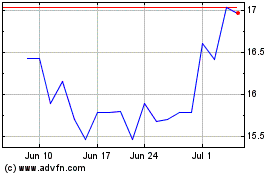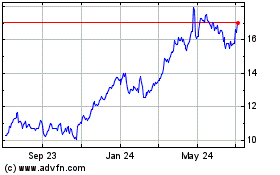By Jenny Strasburg
Deutsche Bank AG officials approved the sale of a chunk of
Silicon Valley real estate to a Russian businessman despite
objections from its U.S. reputational risk committee, according to
documents and people familiar with the matter.
The lender's Germany-based global reputational-risk committee
approved the $72 million deal in May 2018, overruling concerns
raised by executives including the one responsible for Deutsche
Bank's U.S. anti-money-laundering controls, the people said.
While disagreements within banks are common, the discord within
Deutsche Bank was notable because it occurred while congressional
lawmakers were scrutinizing the bank's Russian business
relationships. And the bank's U.S. committee is rarely overruled,
according to people inside the bank.
Deutsche Bank continues to provide documents to Congress in a
probe of money-laundering controls and longtime links with Russian
companies and oligarchs. A U.S. Justice Department investigation
into aspects of those Russian relationships and the bank's handling
of internal red flags is continuing, according to people close to
the bank and its interactions with investigators.
The bank recently has informed U.S. regulators about the
real-estate transaction, according to people familiar with the
discussions.
In the wake of the sale, some Deutsche Bank managers questioned
whether the lender had learned from past lapses in compliance,
according to people familiar with internal bank discussions.
A bank employee reported the transaction through what is known
as a suspicious activity report to U.S. Treasury officials charged
with policing financial crimes, bank officials have told
colleagues. It couldn't be learned when such a report might have
been filed.
Spokesmen for Deutsche Bank and its asset-management arm, DWS,
said the business was acting as a fiduciary for fund investors.
They said the deal went through the bank's processes to prevent
money laundering and other financial crimes by clients. The deal
didn't involve financing from Deutsche Bank, and the profit went to
the fund, they said.
"Consistent with our policies and procedures, extensive due
diligence was conducted on this transaction and involved, among
others, the [anti-financial crime] unit of Deutsche Bank.
Additionally, the transaction was made subject to the
reputational-risk-assessment procedures in place at that time," a
DWS spokesman said.
The bank identified no evidence the deal "would violate
money-laundering or sanctions laws. As a result, the discussion of
whether to move forward with the transaction was focused on
reputational considerations, " a spokesman for Deutsche Bank said.
He added: "There are processes in place that govern reputational
risk considerations, and regional and global judgments about these
considerations can differ, as occurred in this instance."
Deutsche Bank is one of Wall Street's most troubled operators,
hamstrung by a legacy of aggressive lending practices and
regulatory lapses. The bank has paid large fines for failures to
police money coursing through its network, including transactions
that moved billions of dollars out of Russia. The bank is currently
going through a painful downsizing.
Deutsche Bank's asset-management arm bought into the property on
behalf of clients in 2016. A private Bay Area firm called
Embarcadero Capital Partners also held a joint stake, according to
the companies. Embarcadero Capital executives didn't respond to
requests for comment.
The 6.6-acre property is located at 80 Willow Road in Menlo
Park, Calif., featuring a single-story office complex with
Spanish-colonial adobe and midcentury modernist design and
expansive gardens. It was built in the early 1950s as the
headquarters of Sunset Magazine, and used by the publisher, later
owned by Time Inc., for offices, photography shoots and public
tours for decades.
The buyer was Vitaly Yusufov, Russian financier and son of
former energy minister Igor Yusufov, according to documents and
people familiar with the matter. He purchased the property through
a Delaware-registered company, according to internal bank documents
and people involved in the sale. Neither Vitaly Yusufov nor his
father responded to repeated requests for comment.
In 2017, looking to take advantage of strong Silicon Valley
property prices, Deutsche Bank and its investment partner put the
property on the block. Several offers fell through, according to
bank documents.
By early April 2018, Mr. Yusufov, through his 100% ownership of
Willow Project LLC, committed to pay $72 million in cash, with a
$15 million nonrefundable deposit and a closing in 15 days,
according to bank documents and a real-estate broker on the
deal.
Deutsche Bank was in a pickle. Its asset-management arm had an
obligation to sell the property for the highest price it could for
its clients and its partner. But executives were concerned about
drawing unwanted attention by enabling Russian money into the U.S.,
according to documents recording internal bank deliberations.
The bank considered Mr. Yusufov a "politically exposed person,"
according to the documents, a designation banks give clients who
require extra scrutiny. His father held senior government positions
for more than a decade, including serving as Russia's energy
minister in the early 2000s.
The younger Mr. Yusufov worked with state-owned gas giant
Gazprom PJSC. He played a key role in a 2011 deal that transferred
control of the Bank of Moscow to state-controlled VTB Bank,
according to press reports.
Deutsche Bank's money-laundering watchdogs didn't reject the
deal. But, according bank documents, they felt it was important
enough to escalate it to the U.S. reputational-risk committee,
which looks after the bank's broader image and relationships with
regulators.
Areas of confusion included the origins of the $72 million and
whether Vitaly Yusufov was already a Deutsche Bank client, a factor
that could work in his favor.
In some communications he is described as a "recently onboarded"
wealth-management client in Europe. A memorandum says Mr. Yusufov
"has been very vocal with [Embarcadero Capital] that he is an
existing client of DB in Europe and he is very frustrated that
DWS's transactional AML process would delay this transaction,"
referring to anti-money-laundering.
The officials weighed whether a rejection could hurt the bank's
business with Mr. Yusufov in other areas.
Documents show Deutsche Bank officials later clarified that Mr.
Yusufov's father, not Vitaly, was the existing private-bank
client.
On April 6, 2018, the bank's U.S. reputational-risk committee
declined approval. It cited the political climate, potential for
additional Russia sanctions and material risk to the bank.
Officials included the bank's U.S. general counsel, Steve Reich,
and then-head of anti-financial crime for the Americas, Richard
Weber.
The real-estate team appealed, leading to a tense April 30 call
of the global reputational-risk committee including top executives
in Frankfurt and London.
The call included Chief Risk Officer Stuart Lewis, President
Karl von Rohr and General Counsel Florian Drinhausen and colleagues
from the investment bank and corporate communications office.
Mr. Weber also joined, as a delegate for the global head of
financial crime-fighting. Meeting minutes show he told colleagues
the bank had received a request from Congress within the previous
10 days asking for information on "wealthy Russian oligarchs." He
said a Justice Department investigation into Deutsche Bank's Russia
dealings was under way.
Mr. Weber didn't respond to requests for comment.
Other executives agreed the deal posed risks but noted that the
Yusufovs weren't under sanctions.
"The risks from the heightened focus on Russia and the Russia
connection to this matter," Mr. Lewis told colleagues, "was offset
by the transaction being on behalf of the investors in the
fund."
The vote: six to one in approval, with Mr. Weber dissenting.
A bank spokesman declined to comment on behalf of the executives
on the call.
Public records show Willow Project LLC took ownership of 80
Willow Road on May 17.
In October 2018, Deutsche Bank told employees Mr. Weber was
leaving the bank. He has since joined a competitor.
--Elisa Cho, Jim Oberman and Lisa Schwartz contributed to this
article.
Write to Jenny Strasburg at jenny.strasburg@wsj.com
(END) Dow Jones Newswires
October 31, 2019 16:43 ET (20:43 GMT)
Copyright (c) 2019 Dow Jones & Company, Inc.
Deutsche Bank Aktiengese... (NYSE:DB)
Historical Stock Chart
From Mar 2024 to Apr 2024

Deutsche Bank Aktiengese... (NYSE:DB)
Historical Stock Chart
From Apr 2023 to Apr 2024
